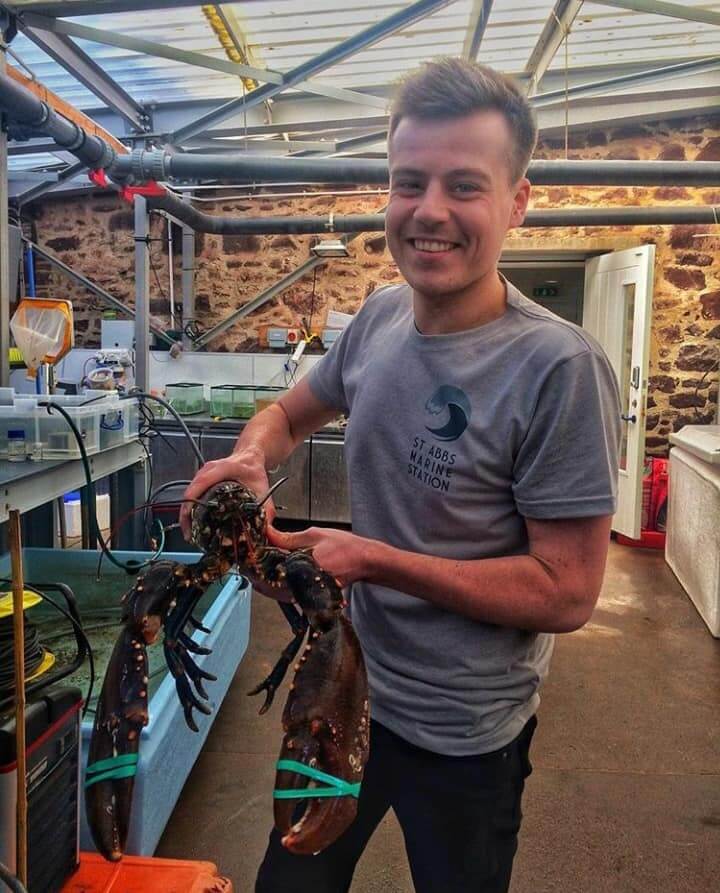
RESEARCH INTERESTS
My current field of research is focused on the commercially important edible crab (Cancer pagurus) and European lobster (Homarus gammarus) populations in the Berwickshire Marine Reserve. The research encompasses four projects that try to understand how the current fishery is utilized by the local inshore fishermen. Through annual monitoring of juvenile C.pagurus numbers, fishing effort of the local inshore fishing fleet, distribution and movement patterns of C.pagurus and H.gammarus, and the intra and inter specific behaviours around different fishing gear I hope to provide a baseline for future monitoring and management.
In addition, I have worked on separate projects focused around anthropogenic stressors, in particular electromagnetic fields, to provide baseline measurements of behaviour and physiology of C.pagurus and H.gammarus for monitoring purposes regarding offshore renewables.
I have a keen interest to study the effects of climate change and other anthropogenic stressors on marine algae and other coastal invertebrates and how this will affect the biodiversity of the Berwickshire Marine Reserve.
CURRENT PROJECTS
- Distance and Directional Preference of Homarus gammarus and Cancer Pagurus in the Berwickshire Marine Reserve
- CPUE (Catch per Unit Effort) of the Local Inshore Fishermen in the Berwickshire Marine Reserve
- A Baseline Assessment of the Intertidal Juvenile Cancer Pagurus Population in the Berwickshire Marine Reserve, Scotland
- Inter and Intra specific behaviours of Homarus gammarus and Cancer pagurus in relation to fishing gear types
- Size at Sexual Maturity of the Edible Crab (Cancer pagurus) in Berwickshire and Northumberland
- Artificial habitat design and in-depth behavioural analyses of the European lobster, Homarus Gammarus
PUBLICATIONS
Easton, B.A.A.; Boon, A.; Richards, J.; Scott, K. Comparing the Size at Onset of Sexual Maturity of Edible Crab (Cancer pagurus, Cancridae) in Berwickshire and Northumberland. Fishes 2023, 8, 260. https://doi.org/10.3390/fishes8050260
Harsanyi, P.; Scott, K.; Easton, B.A.A.; de la Cruz Ortiz, G.; Chapman, E.C.N.; Piper, A.J.R.; Rochas, C.M.V.; Lyndon, A.R. The Effects of Anthropogenic Electromagnetic Fields (EMF) on the Early Development of Two Commercially Important Crustaceans, European Lobster, Homarus gammarus (L.) and Edible Crab, Cancer pagurus (L.). J. Mar. Sci. Eng. 2022, 10, 564. https://doi.org/10.3390/jmse10050564
Scott K, Harsanyi P, Easton BAA, Piper AJR, Rochas CMV, Lyndon AR (2021) Exposure to Electromagnetic Fields (EMF) from Submarine Power Cables Can Trigger Strength-Dependent Behavioural and Physiological Responses in Edible Crab, Cancer pagurus (L.). Journal of Marine Science and Engineering. 9(7):776.
All publications are available to view via my ResearchGate profile.
EDUCATION
BSc (Hons) Marine Biology, Heriot-Watt University, UK (2012 – 2016)
BSc dissertation: Is wave action aiding the damage of Serpula vermicularis reefs in Loch Creran, Scotland?”
MSc Climate Change: Managing the Marine Environment, Heriot – Watt University, UK (2016 – 2017)
MSc dissertation: Carbon Demand of Epibenthic Megafauna in the Arctic (Svalbard) under Changing Climatic Conditions
Student Supervision
2021 – 22 Sarah Kane (MSc): Listening Lines: Assessing the Feasibility of Deploying HydroMoths on Static Fishing Gear to Monitor Cetaceans
2022 – 23 Baptiste Canton-Lamousse (BSc): A Contribution to the Economic Study of the Impact of Sargassum on Tourism in Belize and Courses of Action